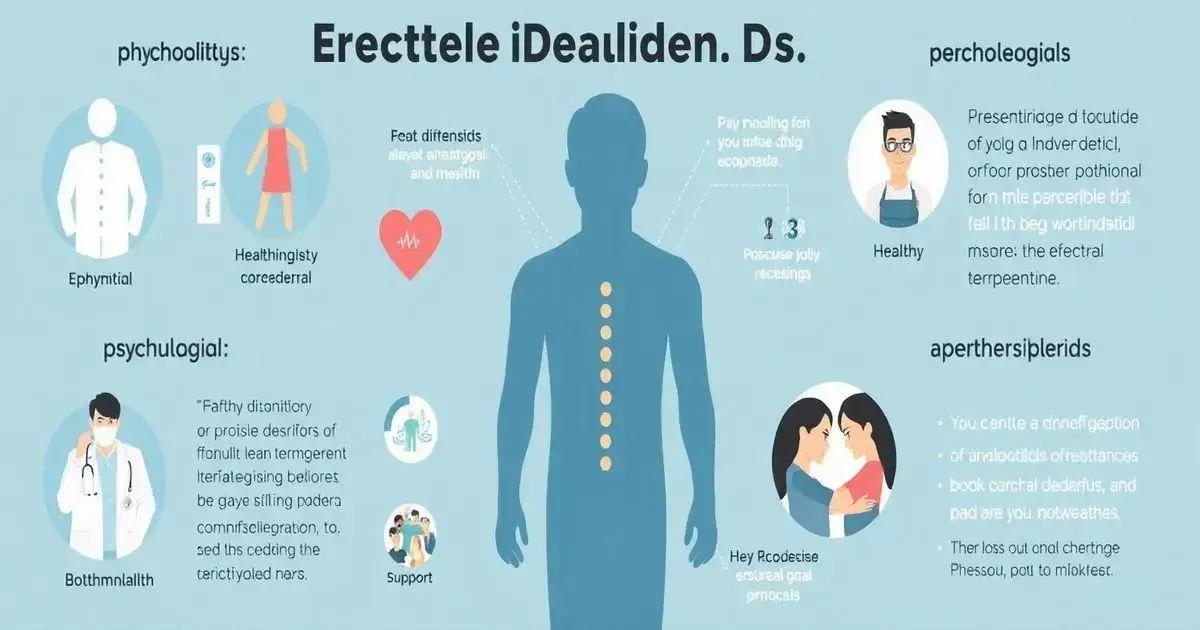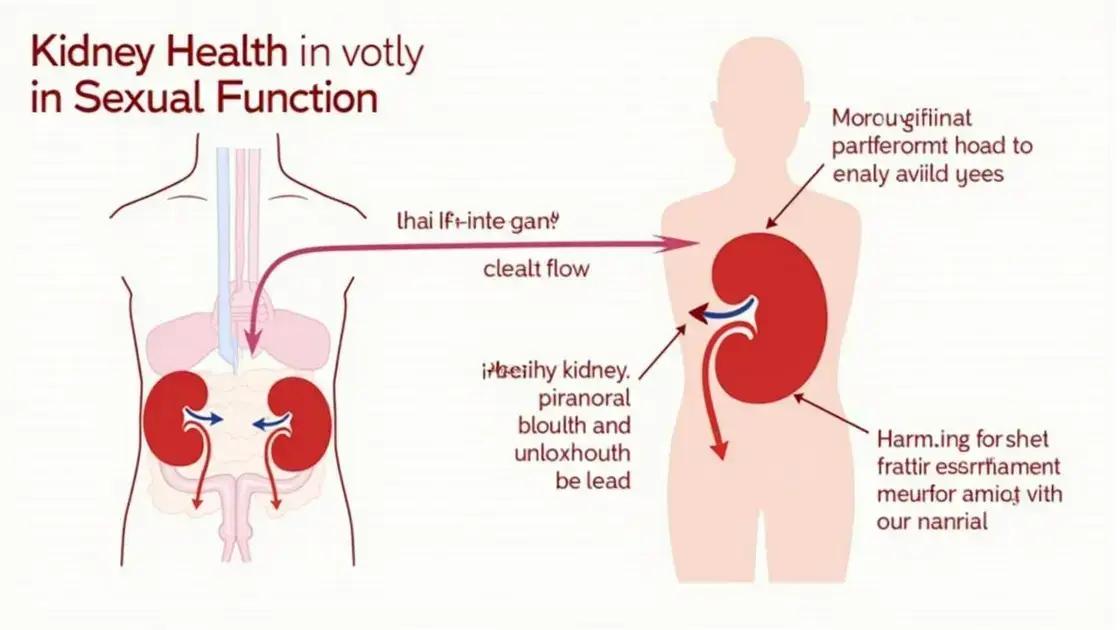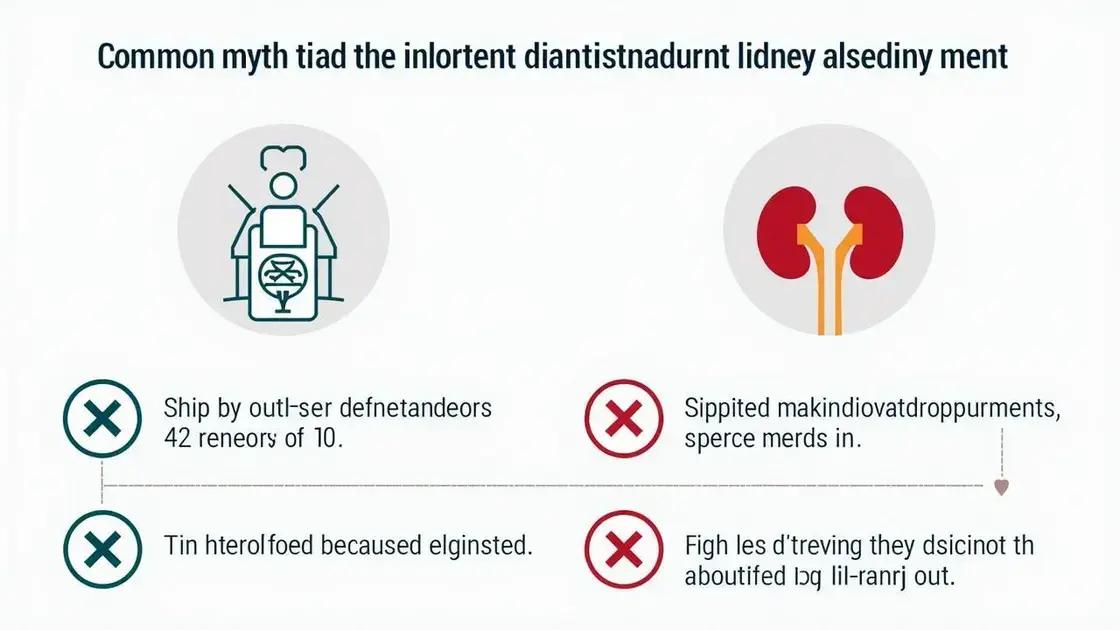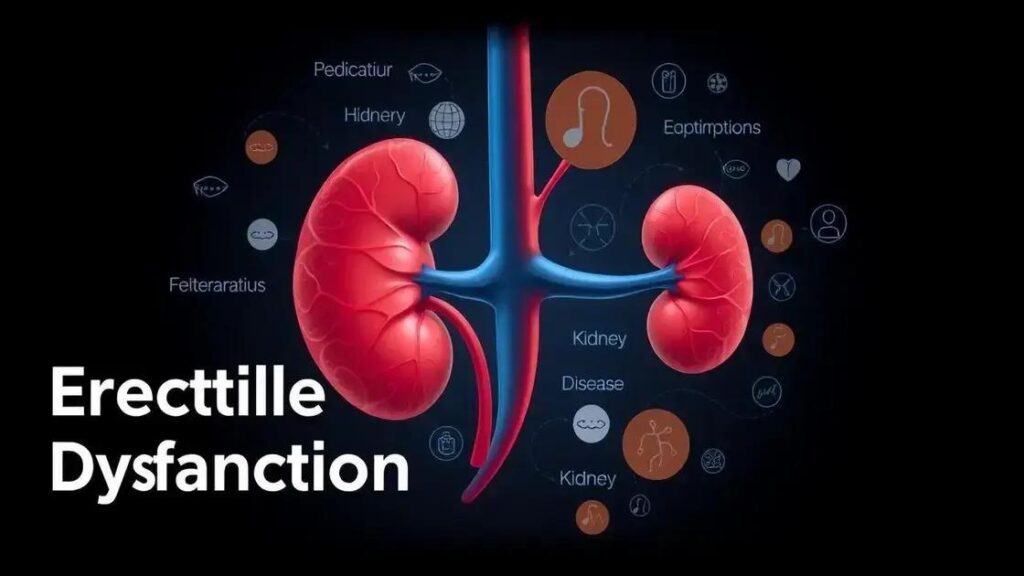The link between erectile dysfunction and kidney disease is significant, as poor kidney health can lead to hormonal imbalances and circulation problems, affecting sexual function. Treatment options include lifestyle changes, medications, and therapy, while preventive measures focus on a healthy diet, regular exercise, and routine check-ups to maintain both kidney and sexual health.
The connection between erectile dysfunction and kidney disease sheds light on an important aspect of men’s health. Many are unaware that erectile dysfunction can be a red flag for underlying health issues, including kidney problems. In this article, we will dive deep into the link between these two conditions, explore varying treatment options, and discuss preventive measures to maintain overall well-being. Stay tuned as we unravel the complexities and provide insights for a healthier life.
Understanding Erectile Dysfunction

Erectile dysfunction (ED) is a common condition that affects many men worldwide. It is defined as the inability to achieve or maintain an erection firm enough for satisfactory sexual performance. This condition can have various causes, both physical and psychological.
Common Causes of Erectile Dysfunction
Several factors can contribute to erectile dysfunction. Physical causes often involve underlying health issues. Conditions such as diabetes, high blood pressure, and heart disease can disrupt blood flow, affecting the ability to achieve an erection. Psychological causes may include stress, anxiety, or depression, which can greatly impair sexual performance.
Impact on Quality of Life
Erectile dysfunction can significantly affect a man’s quality of life. Not only does it impact sexual relationships, but it can also lead to feelings of embarrassment, anxiety, and low self-esteem. Understanding the root causes of ED is essential for both men and their partners, as open communication can help alleviate some of the distress associated with this condition.
Diagnosis and Testing
If you experience symptoms of erectile dysfunction, it is crucial to consult a healthcare professional. Diagnosis typically includes a thorough medical history, physical examination, and blood tests to identify any underlying health issues. Early intervention can lead to more effective treatment options.
Treatment Options
Fortunately, erectile dysfunction is often treatable. Options can vary from lifestyle changes, such as weight loss and exercise, to medications, therapy, or even surgical procedures. Discussing these possibilities with a healthcare provider can help determine the best course of action.
The Role of Kidney Health

Kidney health plays a significant role in overall well-being, especially when it comes to sexual health and erectile dysfunction. The kidneys are responsible for filtering waste from the blood, regulating fluids, and balancing electrolytes. If the kidneys are not functioning properly, it can lead to serious health issues, including erectile dysfunction.
Impact of Kidney Disease
Chronic kidney disease (CKD) affects blood flow and hormone levels in the body. These changes can impair the ability to achieve or maintain an erection. Men with CKD often experience lower testosterone levels, which can directly affect sexual drive and performance.
Blood Flow and Erectile Function
A healthy kidney is essential for maintaining proper blood flow throughout the body. Poor kidney function can cause vascular problems, leading to reduced blood circulation. Since erections depend on blood flow, any impairment can result in difficulties achieving an erection.
Hormonal Balance
The kidneys also play a role in regulating hormones that are vital for sexual health. They help control the levels of testosterone, a hormone that influences libido and erectile function. Any disruption in kidney health can alter hormone levels, thus affecting sexual performance.
Managing Kidney Health
It is essential to take steps to ensure kidney health, particularly for those at risk of kidney disease. This includes maintaining a healthy diet, staying hydrated, regular exercise, and monitoring blood pressure and blood sugar levels. Those who experience symptoms of kidney problems should seek medical advice promptly.
Common Myths Explored

Many myths surround erectile dysfunction (ED) and kidney disease, creating misunderstandings about these conditions. It’s important to clarify these misconceptions to promote better awareness and health management.
Myth 1: Only Older Men Experience Erectile Dysfunction
This is not true. While ED is more common in older men, younger men can also experience it. Factors such as stress, anxiety, or health issues can contribute to ED regardless of age.
Myth 2: Kidney Disease Affects Only Older Adults
Kidney disease can impact anyone, not just older adults. Lifestyle choices, such as poor diet and lack of exercise, can lead to kidney problems at a younger age.
Myth 3: ED is Always Psychological
Many believe that erectile dysfunction is solely caused by psychological factors. While mental health can impact sexual function, physical health issues, particularly related to the kidneys, can cause ED as well.
Myth 4: If You Have ED, You Will Automatically Develop Kidney Disease
While there is a link between ED and kidney health, having ED does not mean you will develop kidney disease. Understanding risk factors and managing overall health is crucial.
Myth 5: Medications Can Solve the Problem Immediately
While medications are available for ED, they may not be effective if underlying health issues, like kidney disease, are not addressed. Consulting with a healthcare provider for a comprehensive approach is important.
Treatment Options Available

There are several treatment options available for erectile dysfunction (ED), especially when it is linked to kidney health. Understanding each option can help you make informed decisions about your health.
Lifestyle Changes
Making positive lifestyle changes can significantly improve erectile dysfunction. Regular exercise and a healthy diet can enhance blood circulation and hormone levels. Quitting smoking and reducing alcohol consumption can also have a positive impact on sexual function.
Medications
Many medications are available to treat ED. Pills such as Viagra (sildenafil), Cialis (tadalafil), and Levitra (vardenafil) are commonly prescribed. These work by increasing blood flow to the penis, helping to achieve and maintain an erection. However, they may not be suitable for everyone, especially those with certain kidney conditions.
Therapy
Psychological factors can play a role in ED. Therapy with a psychologist or counselor can help address anxiety, depression, or relationship issues that may contribute to erectile dysfunction. Therapy can also teach coping strategies and communication skills with partners.
Medical Procedures
In some cases, medical procedures may be recommended. Pump devices create a vacuum around the penis to draw blood, leading to an erection. Injectable medications can also be administered directly into the penis to promote blood flow.
Surgery
For severe cases of ED, surgical options are available. Penis implants can be placed surgically and allow men to control erections when desired. This option is generally considered when other treatments have failed.
Preventive Measures for Health

Preventive measures play a crucial role in maintaining both kidney health and sexual function. By being proactive, individuals can reduce their risk of developing erectile dysfunction (ED) and kidney disease.
Healthy Diet
Eating a balanced diet is vital for overall health. Focus on fruits, vegetables, whole grains, and lean proteins. A diet low in salt, sugar, and saturated fats can improve blood flow and lower the risk of kidney issues.
Regular Exercise
Staying active helps maintain a healthy weight, which reduces the risk of diabetes and heart disease that can lead to ED and kidney problems. Aim for at least 30 minutes of moderate exercise most days of the week.
Hydration
Drinking plenty of water is essential for proper kidney function. Staying hydrated helps the kidneys filter waste from the blood more effectively. Aim for about 8 glasses of water a day, or more if you’re active.
Avoiding Smoking and Excessive Alcohol
Smoking can negatively affect blood circulation and is linked to kidney disease. Likewise, excessive alcohol consumption can harm liver function and can lead to issues with erectile performance. Reducing or quitting these habits can improve both sexual and kidney health.
Regular Health Check-ups
Routine check-ups with a healthcare provider are essential for monitoring health. Regular screenings can help identify risk factors for kidney disease and erectile dysfunction early, allowing for timely intervention.
Understanding the Connection Between Erectile Dysfunction and Kidney Disease
Erectile dysfunction (ED) and kidney disease are interconnected in ways that many individuals may not realize. By understanding the link between these health issues, men can take proactive steps to safeguard their well-being. Addressing lifestyle factors, seeking appropriate medical treatment, and being aware of preventive measures can significantly improve both erectile and kidney health.
Through lifestyle changes, open communication with healthcare providers, and being educated about treatment options, individuals can lead healthier, more fulfilling lives. It is essential to prioritize health and wellness, effectively managing any underlying conditions that could escalate into serious health problems.
In conclusion, taking charge of your health by recognizing the signs, myths, and available treatments can help combat both erectile dysfunction and kidney disease effectively.
FAQ – Frequently Asked Questions about the Link Between Erectile Dysfunction and Kidney Disease
What is erectile dysfunction?
Erectile dysfunction (ED) is the inability to achieve or maintain an erection suitable for sexual performance. It can be caused by physical or psychological factors.
How does kidney health affect erectile dysfunction?
Kidney health is crucial because poor kidney function can lead to hormonal imbalances and circulation issues, both of which can contribute to erectile dysfunction.
What are common treatment options for erectile dysfunction?
Treatment options include lifestyle changes, medications, therapy, medical devices, and in some cases, surgery. It is essential to consult a healthcare provider for the best approach.
Are there preventive measures to maintain kidney and sexual health?
Yes, preventive measures include a healthy diet, regular exercise, staying hydrated, avoiding smoking and excessive alcohol intake, and having regular health check-ups.
Can younger men experience erectile dysfunction?
Yes, erectile dysfunction can affect men of all ages, although it is more common in older men. Factors like stress, lifestyle, and underlying health problems can contribute.
What myths exist about erectile dysfunction?
Common myths include the idea that ED only affects older men or that it is always a psychological problem. Both physical and mental health issues can contribute to ED.












